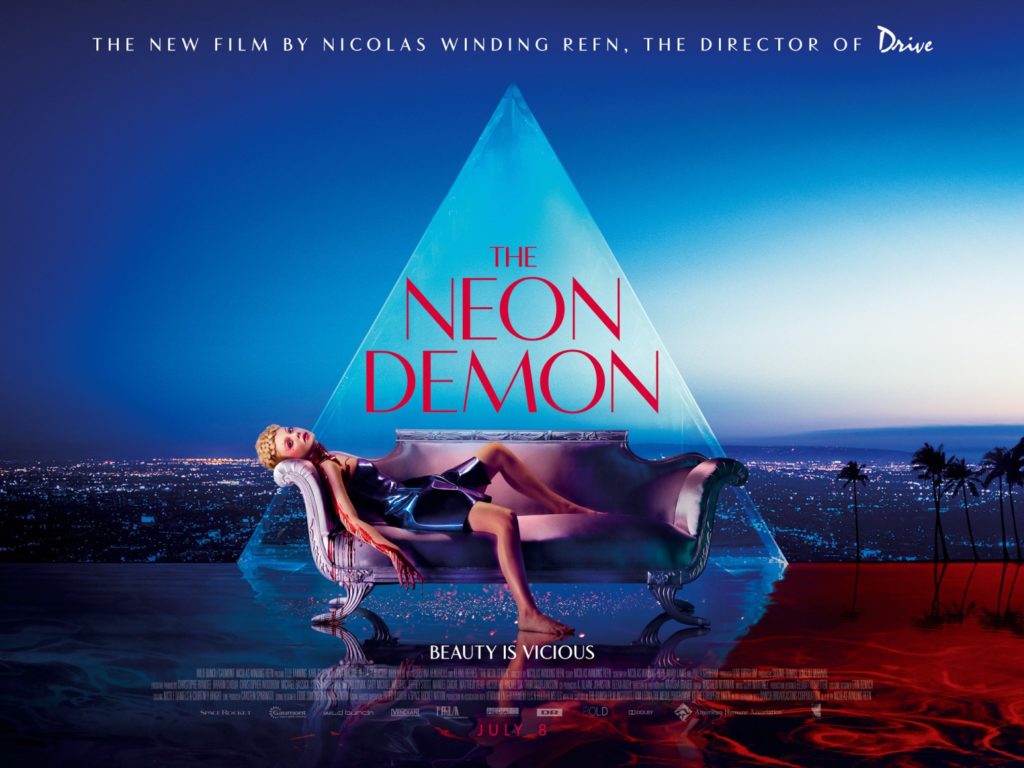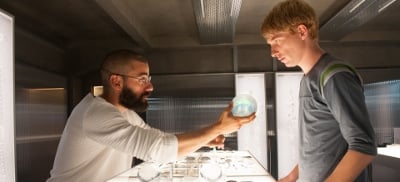Review: The Neon Demon by Nicolas Winding Refn
July 11, 2016

There is a nihilism at the core of Nicolas Winding Refn’s worldview which often threatens to overwhelm the stylistic grace he brings to the screen. As grimly exhilarating as Pusher (1996) and Bronson (2008) were, it wasn’t until Drive (2011) that the NWR aesthetic was twinned with something approaching a populist impulse; blending Walter Hill with Nic Roeg to mesmerising effect. But for all its visual and philosophical force, NWR’s work has often struggled to mould its striking images and affronts to good taste into a coherent whole. This struggle was captured in fascinating detail by NWR’s wife, Liv Corfixen, in the documentary My Life Directed by Nicolas Winding Refn (2014); which captured the production of and reception to NWR’s overripe, adolescent follow-up to Drive, Only God Forgives (2013).
One thing which NWR shares with fellow Dane Lars von Trier is a problematic approach to gender politics; where women have figured at all in his delving into the dark core of the masculine psyche, NWR vacillates between treating them with paternalistic wonder and oedipal horror. The Neon Demon feels like an attempt on NWR’s part to redress the perceived misogyny of his work, without compromising his brutal, polarising spirit. The world of fashion may seem like the inverse of the violent male milieus NWR has explored throughout his oeuvre, but The Neon Demon approaches beauty through the same aggressive prism.
The Neon Demon centres on Jesse (Elle Fanning), who moves to LA with dreams of being a model. On the set of her first shoot with up-and-coming photographer Dean (Karl Glusman), Jesse befriends makeup artist Ruby (Jena Malone), whose attentions are transparently less than honourable to everyone but the guileless Jesse. This fresh-off-the-bus sixteen-year-old is deemed to be in possession of ‘it’; that unsullied, indefinable quality which quickly brings her to the attention of a high-profile modelling agency. Jesse’s status as the freshest face in town draws the ire of fellow models Gigi (Bella Heathcote) and Sarah (Abbey Lee), who conspire to undermine Jesse as she encounters highly-strung photographers, hyper-pretentious designers and Mephistophelian agents in this profligate and predatory world.
The Neon Demon is a beautifully constructed ugly film: Natasha Braier’s cinematography is a sickening battery of livid pinks, purples and reds, while Cliff Martinez’s score alternates between tense electro and thumping industrial soundscapes; but Peter Strickland captured this giallo-inflected blend of the baroque and the ominous much better in his Berberian Sound Studio (2012) and The Duke of Burgundy (2014). Fanning is a luminous presence, and Keanu Reeves is clearly having fun in his supporting role as a sleazy motel manager; but the characters never rise beyond the level of constructs in a simplistic fable of purity in peril. There is some hideously trite dialogue delivered in a kind of narcotised haze, sloppy symbolism and moments of histrionic silliness which occupy the no man’s land between high camp and euro arthouse. The end result is bombastic, gleefully repellent, and further exposes NWR’s deficiencies as a storyteller; the screenplay – co-written by NWR, Mary Laws and Polly Stenham – is a series of escalating provocations in search of a resolution.
It is unclear if The Neon Demon is intended to be a wicked pastiche in the manner of Beyond the Valley of the Dolls (1970), or if it trots out these well-worn tropes in the absence of anything more substantial to say about the vacuous world of fashion. Either way, what we see feels like a series of Dolce & Gabbana ads directed by Argento, Jodorwsky, Schrader, Cronenberg, et al. In seeking to replicate the gloss, NWR is seduced by it. There is tremendous craft, but an utter absence of narrative and conceptual cogency. What we are left with is a well-dressed but empty-headed jumble which serves to further complicate the place of women in NWR’s universe; once again he falls back on the virtuous/venal dichotomy that runs through his previous work. For all NWR’s proclamations to the contrary, this is not a film that will empower teenage girls; it is more likely to make them queasy. The Neon Demon is the point at which NWR’s nihilism finally slides into full-blown misanthropy.
Follow Daniel Palmer on Twitter at @mrdmpalmer.
Filed under: Film, TV & Tech
Tagged with: danish, demon, elle fanning, film, jena malone, karl glusman, misogyny



Comments